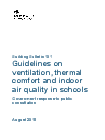Nearly a third of UK children believe schools should be helping to tackle air pollution

UK children have the lowest confidence that adults are doing enough to protect the air they breathe
- New international research finds British children have the lowest confidence that adults are doing enough to protect the air they breathe (24%), with one in ten saying they have never been taught anything about air pollution.
- Nearly a third (27%) of UK children believe schools should be helping to tackle air pollution.
- Nearly half (46%) of UK children believe local leaders should be helping to tackle air pollution.
- Globally, children from the UK, China, India and the US overwhelmingly believe they should have a right to clean air, which is currently not stipulated as a child’s right defined by the UN Convention on the Rights of the Child.
- UK-based sustainability charity Global Action Plan and Blueair launch the “Freedom to breathe” campaign, to empower young people to jointly call on the United Nations to acknowledge their right to clean air.
Children in the UK have the lowest level of agreement that adults are doing enough to protect the air they breathe (at 24%), according to new international research by Global Action Plan and Blueair. This contrasts with children in India who report a higher level of agreement at 71%, as well as half of children in the US (50%) and China (57%) agreeing that adults are doing enough to protect the air children breathe.
The research, which includes an international YouGov poll of over 4,000 children and focus groups* from the UK, China, India, and US, further finds over one in ten British children (12%) believe they have never been taught anything about air pollution.
Additional findings include:
When asked who they think should be helping to make sure children breathe clean air, of UK children:
- 27% believe schools
- 46% believe local leaders (such as councillors, MPs etc.)
- 73% believe the government
- 43% believe businesses.
Two-thirds (67%) of young people from China, India, the UK and US are worried about how air pollution will affect their health, which is almost as much as they worry about the health impacts of catching COVID-19 (72%)
The average result (combining all four countries) shows that the children overwhelmingly believe they should have the right to be able to breathe clean air (94%).
Despite predictions by UNICEF that by 2050 air pollution will become the leading cause of child mortality, clean air is currently not among children’s rights defined by the UN Convention on the Rights of the Child and is not formally recognised worldwide. In light of this and the overwhelming support from children globally through the polling, Global Action Plan and Blueair today launch of the “Freedom to breathe” campaign.
The campaign aims to empower young people globally to jointly call on the United Nations to acknowledge their fundamental right to clean air.
As part of the campaign, a school’s programme is educating children on the importance of breathing clean air and what they can do to minimise their exposure to common sources of harmful pollution. This is being delivered through local delivery partners in cities from each of the four surveyed countries which have some of the worst levels of recorded pollution – London, Beijing, Delhi, and Los Angeles.
Sonja Graham, CEO at Global Action Plan, says:“It is astounding that clean air is not among the rights of children worldwide. Access to clean air is vital for children to be able to live long healthy lives and realise their full potential. Children have the right to clean water, a safe home, why do they not have a right to clean air to breathe?”
Sara Alsén, Chief Purpose Officer at Blueair says: “For the last 25 years, Blueair has been fighting for every child’s right to breathe clean air. By teaming up with civil society actors who share our belief that it’s time to make access to clean air—like access to clean water—the right of every child, we are bringing our founder’s purpose to life.”
Rosamund Adoo-Kissi-Debrah, Founder of the Ella Roberta Family Foundation and WHO advocate for health and air quality says: “Children have a right to breathe clean air. Children recognise the emergency and are demanding that policy makers do what’s necessary to protect their health and future. The coroner’s decision in Ella’s inquest made clear that the UK needs to adopt WHO air quality guidelines and follow them. But air pollution is a global pandemic, so every country should do the same.”
Respiratory specialist professor Sir Stephen Holgate says: “Children’s developing organs and immune systems make them especially vulnerable to dirty air. As they grow, they continue to be at high risk from air pollution because their immune systems, lungs and brains are still developing. The fact that the air they breathe is not recognised as a right highlights the lack of understanding and awareness surrounding its harmful impacts. Every day, around 93% of the world’s children under the age of 15 are breathing air so polluted that it poses serious risks to their health and development. Globally, we must start treating air pollution with the seriousness it deserves.”
YouGov data: All figures, unless otherwise stated, are from YouGov Plc. Total sample size was 4054
children aged 6 to 15. Fieldwork was undertaken between 12th March – 14th April 2021. The survey was carried out online. The figures have been weighted and are representative of each country (aged 6-15).
*Focus groups were carried out to gain insights from young people about their understanding and perception of air quality issues, and their views around children’s rights and responsibilities to clean air. Focus groups were carried out across Delhi, London, Los Angeles and Beijing with over 150 children aged 7-16, in March – April 2021. They were carried out by; Centre for Environment Education (India), Coalition for Clean Air (USA), Global Action Plan (UK) and Safekids China (China).
Ventilation, thermal comfort and indoor air quality in schools

Building Bulletin 101: Guidelines on ventilation, thermal comfort and indoor air quality in school: government response
Ref: ESFA-00238-2018PDF, 317KB, 22 pages
Detail of outcome
Summary of responses we received, along with the government’s response outlining the next steps.
Read the updated ‘Building Bulletin 101: ventilation for school buildings’ guidance.
BB 101: Guidelines on ventilation, thermal comfort, and indoor air quality in schools
MS Word Document, 2.8MB
Details
This document describes the factors that affect the indoor environment of schools, setting out the regulatory framework for ventilation in schools and gives recommended performance levels for compliance with UK regulations.
The document also provides non-statutory guidance on how to design schools to achieve adequate performance for ventilation, indoor air quality and thermal comfort.
Supporting the document are five simple spreadsheets BB101 Calculation Tools.
Original consultation
Summary
We’re seeking views on proposed revisions to the building bulletin 101 (BB101) guidelines, to replace the 2006 edition.
This consultation was held on another website.
This consultation ran from
to
Consultation description
We invite your feedback on proposed revisions to the 2006 guidelines on ventilation, thermal comfort and indoor air quality in schools.
The revision includes guidelines on indoor air quality and reduction of pollutants.
Published 30 June 2016
Last updated 23 August 2018 + show all updates
- Added government response.
- First published.












Responses